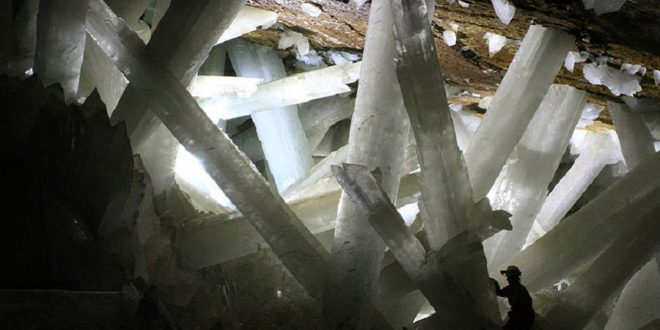Microbes found stowed inside giant crystals in caves in Chihuahua, Mexico, may have survived there for tens of thousands of years.
The extraordinary micro-organisms were found trapped in crystal in a volcanically heated Mexican cave system where temperatures reach 60C (140F).
Some of them are believed to have been there for 60,000 years and were shut off from light or oxygen and obtained energy from minerals.
Scientists have been unable to classify 90% of the bugs, which could not be matched with any other micro-organisms catalogued in available databases.
The microbes are highly diverse and include around 100 different strains made up of both bacteria and other microbes known as archaea.
Five chambers were explored, which ranged in size from an average room to a cathedral-like cavern, at the Naica mine in Chihuahua.
The microbes were contained in small water-filled pockets within the sparkling white crystals, some of which were five metres long and a metre wide.
Dr Penelope Boston, director of NASA’s Astrobiology Institute, who led the first expedition in 2008, said: “The deepest part we accessed was a place called Hell, very evocatively. That chamber is at the 800 metre level.
“It was a transformative experience … it really felt strange. It was a very hard environment to work in, but tear inducingly beautiful. It’s like being inside a geode.”
Scientists wore all-covering “space suits” to protect them from the heat and allow them to breathe.
Experiments to see if the weird bugs could be cultured were partly successful.
“Much to my surprise we got the things to grow,” said Dr Boston, who was speaking at the American Association for the Advancement of Science (AAAS) annual meeting in Boston, Massachusetts.
“It was laborious. We lost some of them – that’s just the game. They’ve got needs we can’t fulfil. That part of it was really like zoo keeping.”
She said the bugs were as different to known micro-organisms as humans and fungi.
Dr Boston added: “They’re really showing us what our kind of life can do in terms of manipulating materials.
“These guys are living in an environment where there’s not organic food as we understand it.
“They’re an example, at very high temperatures, of organisms making their living essentially by munching down inorganic minerals and compounds. This may be the deep history of our life here.”
The bugs may give an indication of what to expect if alien microbes are found on Mars or Jupiter’s moon Europa, which has a global ice-covered ocean.
Agencies/Canadajournal
 Canada Journal – News of the World Articles and videos to bring you the biggest Canadian news stories from across the country every day
Canada Journal – News of the World Articles and videos to bring you the biggest Canadian news stories from across the country every day



